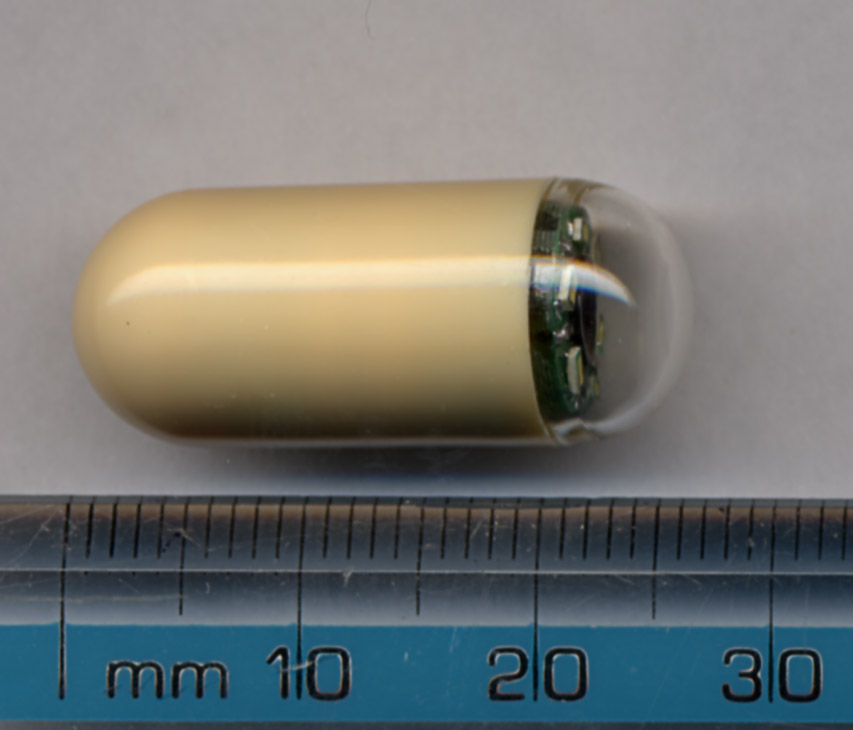This post is solely dedicated to one of my friends, who is doing his MBBS and is a quite passionate about technology. So here is an article that concerns both technology and medicine.
 We do see that technology has a greater inpact on medicine these days. Starting from medicine productioin to complicated surgeries without the help of technology might well prove to be very tough.One such usage that really fascinated me is CAPSULE ENDOSCOPY. As of today in many hospitals we find a normal methodology of endoscopy being followed,hich is a long, thin tube inserted into the rectum and transversed through the colon or, alternatively, through the mouth and into the stomach and small intestine as a means of mechanically-assisted visualization of these structures. It becomes very tidious task and even the patient has ro suffer a bit. But the technology i am writing about, simplifies this task and does endoscopy a simply procedure. In Capsule Endoscopy(CE) uses a small capsule sized device with a camera fitted at the apex which does the photographer's job. An intestine is usually very long(around 25-30 mtrs). As per today, no scope is available which will cover the whole of intestine. This is where techiqueof CE scores above the others. Because the capsule is swallowed and travels through the digestive system, capsule endoscopy takes a longer amount of time than traditional endoscopy. The images are of good quality, comparable to those from scopes. The test carries a high sensitivity and specificity for detecting lesions. Early research has shown that capsule endoscopy can detect evidence of disease in some cases that traditional endoscopy cannot. The technology is used by gastroenterologists to detect diseases such as Crohn's disease, gastric ulcers, and colon cancer. At the present time, the capsule camera is primarily used to visualize the small intestine. Whereas the upper gastrointestinal tract (esophagus, stomach, and duodenum) and the colon (large intestine) can be very adequately visualized with scopes.
We do see that technology has a greater inpact on medicine these days. Starting from medicine productioin to complicated surgeries without the help of technology might well prove to be very tough.One such usage that really fascinated me is CAPSULE ENDOSCOPY. As of today in many hospitals we find a normal methodology of endoscopy being followed,hich is a long, thin tube inserted into the rectum and transversed through the colon or, alternatively, through the mouth and into the stomach and small intestine as a means of mechanically-assisted visualization of these structures. It becomes very tidious task and even the patient has ro suffer a bit. But the technology i am writing about, simplifies this task and does endoscopy a simply procedure. In Capsule Endoscopy(CE) uses a small capsule sized device with a camera fitted at the apex which does the photographer's job. An intestine is usually very long(around 25-30 mtrs). As per today, no scope is available which will cover the whole of intestine. This is where techiqueof CE scores above the others. Because the capsule is swallowed and travels through the digestive system, capsule endoscopy takes a longer amount of time than traditional endoscopy. The images are of good quality, comparable to those from scopes. The test carries a high sensitivity and specificity for detecting lesions. Early research has shown that capsule endoscopy can detect evidence of disease in some cases that traditional endoscopy cannot. The technology is used by gastroenterologists to detect diseases such as Crohn's disease, gastric ulcers, and colon cancer. At the present time, the capsule camera is primarily used to visualize the small intestine. Whereas the upper gastrointestinal tract (esophagus, stomach, and duodenum) and the colon (large intestine) can be very adequately visualized with scopes.  There are a lot of recent activities going on in this field. Ongoing research is continuing in the United States, Israel, Japan, South Korea, and United Kingdom to improve capsule endoscope technology. Sayaka Capsule by RF System of Japan is an advanced capsule with power supplied wirelessly from an external source. In Japan, capsule endoscopy is now approved for use in the small bowel and in Europe, capsule endoscopy is being used for several areas including colon screening since July 2007. The next major development is to enable the capsule to do other functions that are possible with current traditional endoscopes, besides just imaging with a camera. These include multiple therapeutic and diagnostic operations such as ultrasound, electrocautery, biopsy, laser, and heat with a retractable arm.
There are a lot of recent activities going on in this field. Ongoing research is continuing in the United States, Israel, Japan, South Korea, and United Kingdom to improve capsule endoscope technology. Sayaka Capsule by RF System of Japan is an advanced capsule with power supplied wirelessly from an external source. In Japan, capsule endoscopy is now approved for use in the small bowel and in Europe, capsule endoscopy is being used for several areas including colon screening since July 2007. The next major development is to enable the capsule to do other functions that are possible with current traditional endoscopes, besides just imaging with a camera. These include multiple therapeutic and diagnostic operations such as ultrasound, electrocautery, biopsy, laser, and heat with a retractable arm.Let us hope that this technology develops soon.........

good article. Very briefly but effectively said. write more on medicle science. i enjoy reading them
ReplyDeletenice one yar...
ReplyDelete